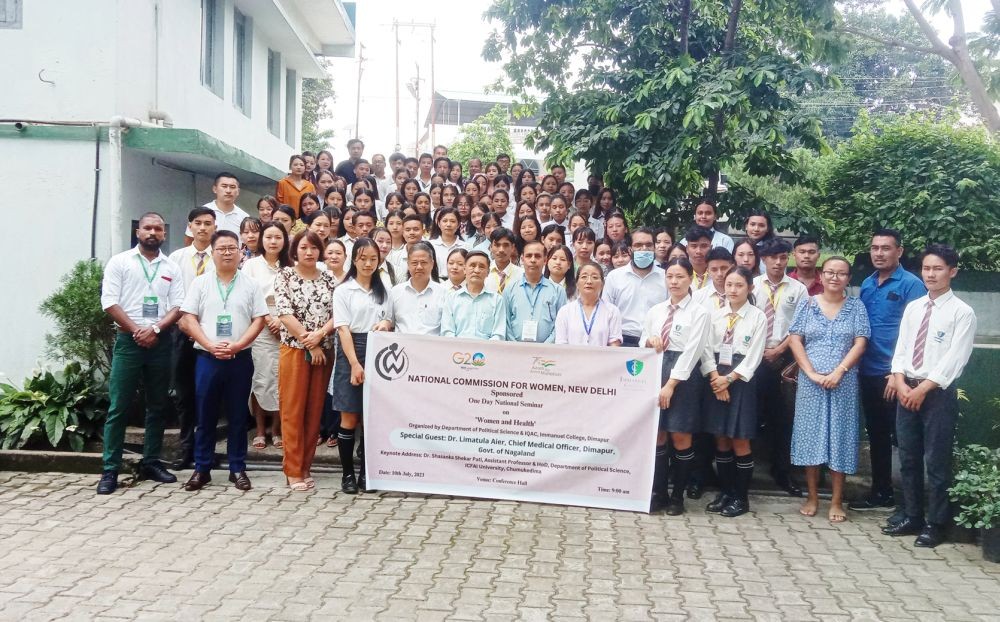Faculty and students of Immanuel College, along with resource persons and others, after a National Seminar on Women and Health held under the patronage of the National Commission for Women at the college on July 10. (Morung Photo)

‘Women never been central to India’s health policies’
Morung Express News
Dimapur | July 10
The Department of Political Science and the Internal Quality Assurance Cell (IQAC), Immanuel College, Dimapur, organised a National Seminar on Women and Health, on July 10, under the patronage of the National Commission for Women. The event aimed to shed light on the multi-faceted issues affecting women’s wellbeing in India, with a particular emphasis on the role of the state and private sector.
Dr Shasanka Sekhar Pati, Assistant Professor and HoD, Department of Political Science, ICFAI University, Nagaland, delivered the keynote address, focusing on a perceived gender disparity in India’s health sector.
Skewed healthcare
Dr Pati argued that access to healthcare, a fundamental human right, is compromised for a considerable part of the population, particularly women, due to a combination of physical, financial, and socio-cultural factors.
“The continued apathy of the government to recognize health and healthcare as a national priority, coupled with the legitimization of an unregulated private sector, has created an environment where healthcare access is not a given,” he said.
Further, he held that the lack of access was further accentuated by a skewed distribution of healthcare in the country, where 75 percent of the infrastructure is concentrated in urban areas, while rural and remote regions remain under-served.
Impact on Women's Health
Dr Pati pointed out that the inadequate investment in health infrastructure (1.3% of the national GDP) for healthcare compared to the global average of 6 percent has severely impacted women, especially those living in poverty. India’s stark socio-economic disparities also exacerbate health inequities, with 27 percent of the population living below the poverty line.
According to him, the cost of care has become a significant barrier for the marginalised to access quality health services.
Citing recent health indicators, Dr Pati drew attention to the alarming statistics. “About 800 women die every day of preventable causes related to pregnancy and childbirth globally, and 20 percent of these women are from India,” he noted. He further highlighted an increased prevalence of anaemia among women and children, despite various programmes and policies in place for the past 70 years.
He also stressed on the importance of comprehensive healthcare, incorporating mental health, contraception awareness, and family planning needs, along with accountability for providing high-quality services to women as a crucial dimension of women's rights.
Societal Factors
Dr. Pati highlighted societal factors such as gender disparities, early marriage, domestic violence, sexual abuse, malnutrition, poverty, illiteracy, and limited access to quality healthcare, which gravely affect women’s health.
"Since the inception of planned development in independent India, women have never been central to health policies," he said. Focussing on reproductive health issues and “gender-blind” health programmes, he said, has come at the cost of overlooking the broader spectrum of women’s health, resulting in males often becoming the primary beneficiaries of intervention.
He said, “Outlays for health should not only be increased, but need to be targeted at the major age-specific health concerns of women.”
Neoliberal Model and Impact
The Assistant Professor also addressed what he said was the adverse effects of the “neoliberal economic model” adopted by India post Liberalisation. He named corporatisation of health, among other welfare sectors, as resulting in an increased marginalisation of women, especially in remote parts of the country.
The thrust on corporate medical care has given rise to a system privileging urbanised, tertiary level care with profitability prevailing over equity, effectively barring the poor, women and other marginalised communities from accessing necessary care, he said.
“The profit-oriented corporate health care services have not only led to unethical practices but also reduced the concentration of trained medical practitioners in the public sector, especially in rural areas. These processes have further impoverished the poor in general and women in particular,” he said.
While stating that India’s health sector is one of the most privatised globally, he said that the state is spending less than 1 percent of the GDP on healthcare. It translates into the government bearing only 17 percent of the total health expenditure and the rest “by people's own resources.”
Integrated women's health policy
In light of the disparities, Dr Pati urged the state to devise an integrated women's health policy, taking into account the numerous factors that influence women’s health. He called for a gender-sensitive public policy that considers the connections between women’s health outcomes, social status and other aspects of life.
He pointed out that the prevailing patriarchal/feudal norms, lower social value, limited autonomy and restricted mobility and access to medical care are some of the causes that affect women’s health status. As such, he said that only a woman-centred integrated health policy can effectively address all the “direct and indirect determinants” to women’s wellbeing.
“In order to improve women’s health status, policy attention should be spread over the entire life cycle. A healthy infancy translates into lower female infant mortality, healthy adolescence means fewer cases of pregnancy-related anaemia, fewer maternal deaths and fewer low-birth and under-weight babies,” he said.
He further stressed the importance of improving healthcare services and education to empower women and prevent them from falling victim to severe emotional and mental trauma.





